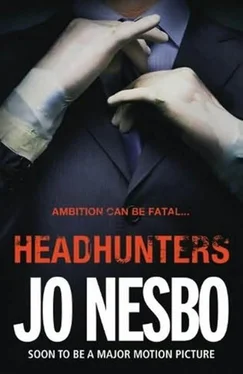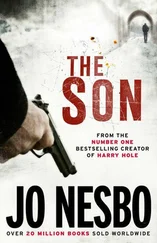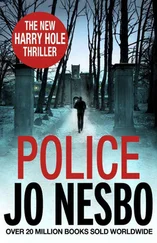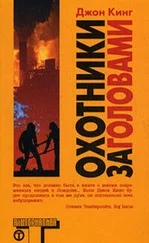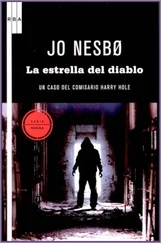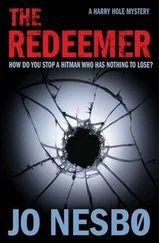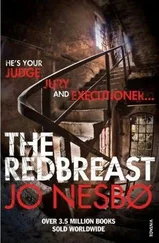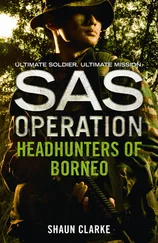My Volvo slipped into a line of cars all in the same price bracket and I turned off the ignition. No one would remember the car. I took the black portfolio and walked up the hill to Lander’s house. My jacket was in my car and I had put on a blue boiler suit without any markings or logos. The cap concealed my hair, and no one would be surprised by sunglasses as it was still one of those radiant autumn days with which Oslo is so blessed. Nevertheless I cast my eyes down on meeting one of the Filipina girls who push prams for the ruling classes in this suburb. But the short street where Lander lived was otherwise deserted. The sun flashed against the panoramic windows. I checked the Breitling Airwolf watch that Diana had given me for my thirty-fifth birthday. Six minutes past twelve. It was six minutes since the alarm in Jeremias Lander’s house had been deactivated. It had happened quietly on a computer in the security company’s operations room, via a technical back door that ensured that the outage would not be registered on the data log of shutdowns and power cuts. The day I employed the security chief of Tripolis had indeed been manna from heaven.
I went up to the front door and listened to the birds chirping and the setters barking in the distance. In the interview Lander had said he didn’t have a home help, a wife or grown-up children in the house during the day or any dogs. But you could never be one hundred per cent sure. I generally worked on a ninety-nine and a half per cent basis, and the uncertainty of the half a per cent was compensated for by the supply of adrenalin: I observed, listened and sensed better.
I took out the key I had been given by Ove at Sushi &Coffee, the spare key that all customers have to deposit with Tripolis in case of burglary, fire or a systems failure while they are away. It slid into the lock and turned with a well-lubricated click.
Then I was inside. The discreet alarm on the wall slept with extinguished plastic eyes. I put on the gloves and taped them to the sleeves of my overall so that no loose body hairs should fall onto the floor. Pulled the bathing cap from under my hat down over my ears. The important thing was not to leave any DNA evidence. Ove had once asked me if it wouldn’t be just as well to shave my head.
I had given up trying to explain to him that after Diana my hair was the last thing with which I was willing to part.
I had plenty of time but still hurried down the hall. On the wall above the staircase hung portraits of what must have been Lander’s children. I am at a complete loss to understand what it is that makes grown people spend money on whoring artists’ embarrassing lachrymose versions of their beloved offspring. Do they like to see their guests blush? The living room was lavishly furnished but humdrum. Apart from Pesche’s fire-engine-red chair, which looked like a buxom woman with her legs apart, who had just given birth to a baby: the big square pouffe you can rest your feet on. Doubt if it was Jeremias Lander’s idea.
Above the chair hung the picture, Eva Mudocci , the British violinist Munch had met at around the turn of the previous century and whom he had sketched straight onto stone when doing her portrait. I had seen other copies of the print before, but it wasn’t until now, in this light, that I could see who Eva Mudocci resembled. Lotte. Lotte Madsen. The face in the picture had the same pallor and melancholy in her eyes as the woman I had so emphatically deleted from my memory.
I took the picture off the wall and placed it on the table face down. Used a Stanley knife to cut. The lithograph was printed on beige paper and the frame was modern, so there were no pins or tacks that had to be removed. In short, the simplest of jobs.
Without warning the silence was broken. An alarm. An insistent pulsation fluctuating in frequency from under a thousand hertz to eight thousand, a sound that cuts through the air and background noise so effectively that you can hear it several hundred metres away. I froze. It lasted only a few seconds, then the alarm in the street stopped. The car owner must have been careless.
I continued working. Opened the portfolio, laid the lithograph inside and took out the A2 sheet of Miss Mudocci that I had printed off at home. Within four minutes it was framed, in place and hanging on the wall. I angled my head and inspected it. It could be weeks before the victims of our scam discovered the most ridiculously obvious of fakes. In the spring I had replaced an oil painting, Knut Rose’s Horse with Small Rider , with a picture I had scanned from an art book and blown up. Four weeks passed before the theft was reported. Miss Mudocci would probably be given away by the whiteness of the paper, but it might take some time. And by then it would be impossible to pinpoint the time of the theft, and the house would have been cleaned enough times to remove all traces of DNA. Because I knew they would look for DNA. Last year, after Kjikerud and I had performed four burglaries in under four months, Inspector Brede Sperre – that blond, media-horny idiot – appeared in Aftenposten maintaining that a gang of professional art thieves was on the prowl. And that even though the values involved were not the highest, the Robberies Unit – in order to nip this turn of events in the bud – were using investigative methods normally reserved for murder and the big drug busts. All citizens of Oslo could rest assured on that account, Sperre had said, letting his boyish locks flutter in the wind and looking into the camera lens with steely grey eyes as the photographer snapped away. Of course he had not told the truth: that this priority was being pushed on them by the residents of these areas, the affluent people with political influence and the will to protect theirs and their kind. And I had to admit that I gave a start when Diana, earlier that autumn, had told me that the dashing policeman in the papers had been into the gallery, wanting to know whether anyone had been grilling her about her clients and who had which works of art in their homes. Apparently the art thieves were well informed about what was hanging where. When Diana had queried the reason for my furrowed brow, I had given her the wry smile and replied that I didn’t much like having a rival closer than two metres to her. To my surprise, Diana had blushed before laughing.
I marched smartly back to the front door, removed the bathing cap and the gloves with care, wiped the door handle on both sides before letting myself out. The street lay just as morning-still and crisply autumn-dry in the unbroken sunshine.
On my way to the car I checked my watch. Fourteen minutes past twelve. It was a record. My pulse was fast but regulated. In forty-six minutes Ove would activate the alarm in the operations room. And at roughly the same time I guessed that Jeremias Lander would be getting to his feet in one of our interview rooms and shaking the chairman’s hand with a final apology before leaving our offices and placing himself out of my control. But in my stable of candidates, of course. Ferdinand would – as I had instructed him – have to explain to the client it was a shame that this hadn’t worked out, but that if they were going to angle for applicants as good as Lander, they ought to consider jacking up the salary by twenty per cent. A third of more is, as we all know, more.
And this was just the start. In two hours and forty-six minutes I would be going on a big game hunt. A Greve hunt. I was underpaid, so what? Fuck Stockholm and fuck Brede Sperre; I was king of the heap.
I whistled. The leaves crackled beneath my shoes.
IT HAS BEEN said that when the American police investigators Inbau, Reid and Buckley published Criminal Interrogation and Confessions in 1962, they laid the foundations for what have since become the prevailing interview techniques in the Western world. The truth is, of course, that the techniques prevailed long before then, that Inbau, Reid and Buckley’s nine-step model merely summarised the FBI’s hundred-year experience of extracting confessions from suspects. The method has shown itself to be enormously effective, on both the guilty and the innocent. After DNA technology made it possible for old cases to be re-examined, hundreds of people were found to have been wrongly imprisoned in the USA alone. Around a quarter of these wrongful convictions were based on confessions extracted by the nine-step model. That says everything about what a fantastic tool it is.
Читать дальше
